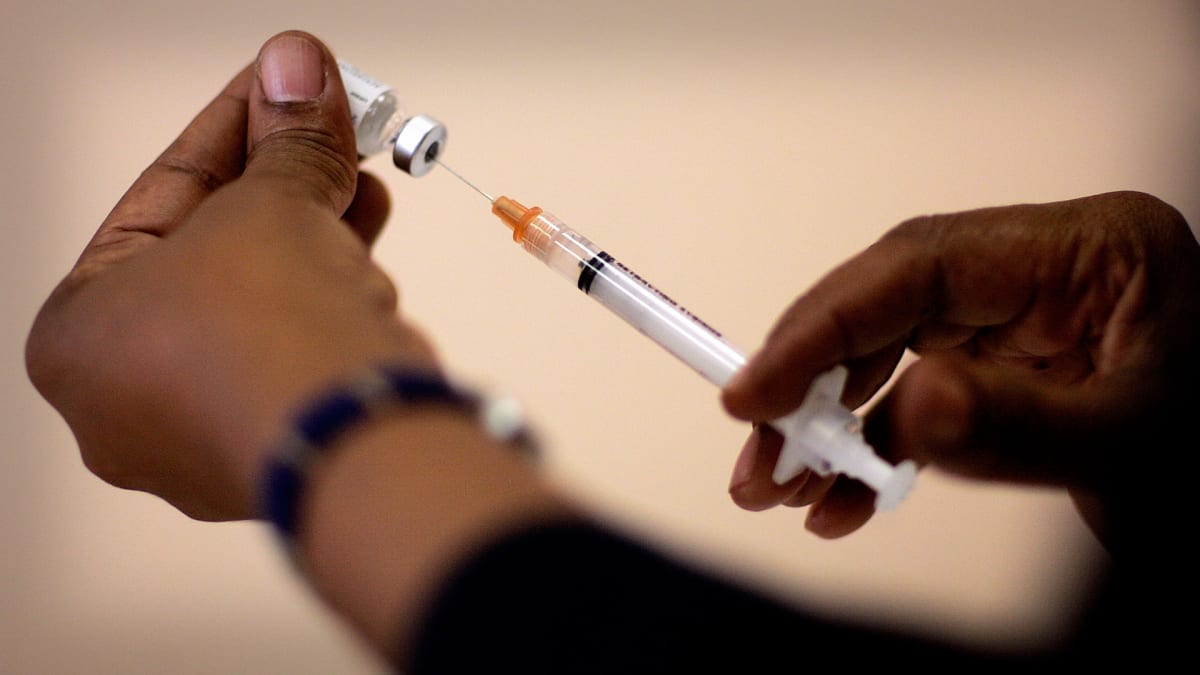
Vaccines are suddenly front and center on Wall Street after years of being a sleepy, albeit economically important, part of drug development.
The coronavirus pandemic led to the emergence of mRNA-based vaccines for viral infections, which generated $54.5 billion in full-year 2021 revenue for the top two products. That included $36.8 billion for Comirnaty, a vaccine from Pfizer (PFE) and BioNTech (BNTX). No other product in the history of drug development has even come close to that haul.
Although sales of coronavirus vaccines will experience a precipitous fall as the world settles into a post-pandemic equilibrium, drug developers are racing to develop new vaccine targets. For one promising opportunity, Pfizer might be taking a backseat.
Vaxcyte (PCVX) announced promising data for its lead vaccine candidate, VAX-24, in pneumococcal diseases. These are a collection of bacterial infections that commonly cause pneumonia, meningitis, and certain types of sepsis. They're also a primary cause of bronchitis, rhinitis, and other ailments.
The Bill Gates-backed vaccine developer appears poised to disrupt the market-leading Prevnar franchise from Pfizer, although VAX-24 requires years of additional clinical development.
Pharma's Race for More Serotypes
Different strains of the same bacteria or virus are sometimes called serotypes. They're not different enough to be classified as a new species, but they are different enough to require specific medicines for effective treatment.
The concept of serotypes is somewhat similar to different strains of the coronavirus SARS-CoV-2. The delta strain is unique from the ever-increasing number of omicron strains. Medicines that worked for delta and earlier versions of omicron may be less effective for newer strains circulating the globe this winter. Believe it or not, scientists are still debating if new strains of SARS-CoV-2 are unique enough to be classified as different serotypes. Even more genetic variability might be required. Let that sink in.
Whereas SARS-CoV-2 is the virus that causes the illness known as covid-19, Streptococcus pneumoniae is the bacteria that causes illnesses such as pneumonia and meningitis. There are over 100 known serotypes of the bacteria, which is often called pneumococcus.
Luckily, not all serotypes cause infection. Most infections in humans are caused by a few dozen serotypes. Nonetheless, developing a vaccine against dozens of bacterial targets can be very difficult, but drug developers are steadily making progress.
- Prevnar 13 from Pfizer provides protection against 13 serotypes that cause serious infection in infants and children.
- Vaxneuvance from Merck (MRK) provides protection against 15 serotypes that cause serious infection in infants, children, and adults.
- Prevnar 20 from Pfizer provides protection against 20 serotypes that cause serious infection in adults age 18 and older.
- Pneumovax23 from Merck provides protection against 23 serotypes that cause serious infection in people age two and older. It's commonly given to individuals who received a vaccine designed against fewer serotypes.
A New Approach to Bacterial Vaccines
Vaxcyte is developing VAX-24 to protect against, you guessed it, 24 serotypes. A second vaccine candidate, VAX-XP, is expected to provide protection against over 30 serotypes. It hasn't entered clinical trials yet.
The company's unique technology platform is also expected to create vaccines that provide higher levels of protection against the same serotypes included in current products.
What makes Vaxcyte's approach different? The precommercial drug developer leans on a technology called cell-free protein synthesis, which is licensed from Sutro Biopharma (STRO).
- Traditional bacterial vaccines and biologic drugs are manufactured using mammalian or bacterial cells. These are often engineered to spit out a protein that can be studied or included in a therapeutic product. However, the proteins that are manufactured this way can change in shape and structure, which means they're not quite the same proteins helping to drive infections. That limits the effectiveness and sometimes safety of the resulting vaccine product.
- Cell-free synthesis straddles the line of biology and chemistry. Essentially, the idea is to take the cellular components that produce proteins – while leaving the cell behind. A cell-free approach can manufacture proteins that more closely match those driving an infection, therefore leading to more effective vaccine products.
Vaccine development isn't just about targeting as many serotypes as possible. Drug developers must balance a range of sometimes conflicting variables.
For example, a vaccine must be safe and effective in individuals of various ages. Regulators often group people into age ranges of infants to age 12, children aged 12 to 17, adults aged 18 to 64, and adults aged 65 and older. The most vulnerable individuals to pneumococcal infections are infants and the elderly – two groups with vastly different levels of immune system activity.
It's also important to at least match what existing vaccines offer with respect to protection.
Vaxcyte's approach appears to be balancing these variables well. According to the company's press release:
- Initial results from an ongoing phase 1/2 clinical trial evaluated VAX-24 in individuals aged 18 to 64.
- The safety and tolerability (the primary data collected in the study) were similar to Prevnar 20 at all dose levels tested.
- All 20 serotypes with overlap to Prevnar 20 achieved non-inferiority, including 16 that generated higher immune responses at the optimal dose level.
- All four serotypes unique to VAX-24 delivered strong and clinically relevant immune responses.
- The next clinical trial(s) will evaluate VAX-24 in children and adults. Delivering successful clinical outcomes in adults age 65 and older will be crucial for commercial success.
Shares of Vaxcyte soared roughly 70% on the data announcement. That values the precommercial drug developer at $2.1 billion, which is a far cry from the market caps of Pfizer and Merck. Considering the Prevnar franchise generates nearly $6 billion in annual revenue, investors might be right to be excited.
It's important to acknowledge the potential advantages of VAX-24 within the competitive landscape. If Vaxcyte can demonstrate superiority or non-inferiority in people of all ages, then it could greatly simplify vaccinations across the population. Doctors might find it difficult to justify giving patients Prevnar 13, Vaxneuvance, or Prevnar 20 when the same or better benefits are provided by a single vaccine.
Investors are certainly right to be excited, and Wall Street is right to reconsider what's a fair valuation for Vaxcyte. Just keep in mind that VAX-24 and VAX-XP are at least a few more years and multiple clinical trials away from hitting the market.







